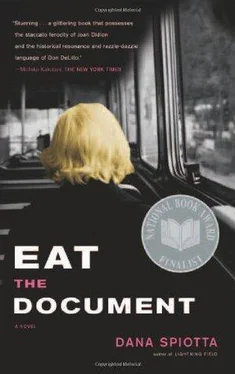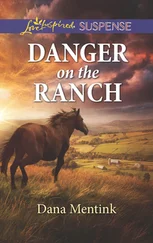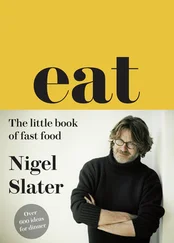Dana Spiotta - Eat the Document
Здесь есть возможность читать онлайн «Dana Spiotta - Eat the Document» весь текст электронной книги совершенно бесплатно (целиком полную версию без сокращений). В некоторых случаях можно слушать аудио, скачать через торрент в формате fb2 и присутствует краткое содержание. Год выпуска: 2006, Издательство: Scribner, Жанр: Современная проза, на английском языке. Описание произведения, (предисловие) а так же отзывы посетителей доступны на портале библиотеки ЛибКат.
- Название:Eat the Document
- Автор:
- Издательство:Scribner
- Жанр:
- Год:2006
- ISBN:нет данных
- Рейтинг книги:3 / 5. Голосов: 1
-
Избранное:Добавить в избранное
- Отзывы:
-
Ваша оценка:
- 60
- 1
- 2
- 3
- 4
- 5
Eat the Document: краткое содержание, описание и аннотация
Предлагаем к чтению аннотацию, описание, краткое содержание или предисловие (зависит от того, что написал сам автор книги «Eat the Document»). Если вы не нашли необходимую информацию о книге — напишите в комментариях, мы постараемся отыскать её.
shifts between the underground movement of the 1970s and the echoes and consequences of that movement in the 1990s. A National Book Award finalist,
is a riveting portrait of two eras and one of the most provocative and compelling novels of recent years.
Eat the Document — читать онлайн бесплатно полную книгу (весь текст) целиком
Ниже представлен текст книги, разбитый по страницам. Система сохранения места последней прочитанной страницы, позволяет с удобством читать онлайн бесплатно книгу «Eat the Document», без необходимости каждый раз заново искать на чём Вы остановились. Поставьте закладку, и сможете в любой момент перейти на страницу, на которой закончили чтение.
Интервал:
Закладка:
A week after Louise had decided to turn herself in and six months after she had abruptly lost her desire for Augie, she discovered she was pregnant.
Revolutionary Acts
THEY BOUGHT a house in deepest middle-class suburbia. It was a split-level. On a cul-de-sac. In a development with other very similar houses. The streets were clean and empty. The house had lots of room, and nothing was broken. It was a clean, safe place. When Louise opened the front door and picked up the paper, she could’ve been in any state from California to Connecticut. As it happened, August had moved them to Washington State just before the birth. Louise remembered at last feeling a distance from smudgy mimeographed broadsides, leaky faucets, and windows that didn’t stay open unless you propped sticks under them. She lived in skylighted, pachysandra-edged comfort, and she was nine months pregnant.
Her thin body stayed thin, but her belly grew and stretched beyond her wildest imaginings. She felt passive beneath it — that taut belly led, and she followed. This was the most specific her body had ever felt. She didn’t feel peaceful or beatific. Nothing as typical as that. She felt her life further reduced to maneuvers and negotiation. Very concrete, physical challenges. Getting out of bed sideways. Bending at the knees to put something in the garbage compactor. This precise body ordered her thoughts. I have to pee. I have to move my leg because it hurts. I have to eat.
And it prescribed what she couldn’t do: She couldn’t get drunk and find some random person to sleep with. She couldn’t run away and change her name and therefore her life — she would still be a nine-months-pregnant woman wherever she went and whatever her name was. And she couldn’t stop it — the barreling of her life toward this new life. So each day she made herself toast and eggs. Each day she watched the TV. She cleaned the house and looked at catalogs. She paid the bills and cooked dinner. When Augie came home, she traded foot rubs with him. She fed him the dinner she had cooked. And she washed dishes, occasionally stopping to prop a hand against her middle back. Augie would ask if he could help her, and she would stoically reply no.
In the final weeks before the birth, she enjoyed cooking and freezing as much food as possible. This was maybe a typical pregnant woman thing to do: prepare for the days ahead with reheatable casseroles and lasagnas. Louise applied a slightly inappropriate energy to these cooking endeavors. Augie bought a freestanding Sub-Zero freezer for her, and she overwhelmed it with individually wrapped and marked meals. Either a baby or a nuclear winter was coming — in either case, they would not starve. The frenzied cooking of those last few weeks was the most satisfying time of her life so far. It had a twisted optimism. It included a future, which was something she hadn’t seen before. Louise abandoned all thoughts of turning herself in. She had to be who she was for quite a while. She at last had no choice. The baby anchored her, finally, in her world. When she gave birth to Jason, she finally found something she believed time would not ever betray or dwindle. The feeling she had for her son was sentimental, it was frightening, it was unimpeachable. It was self-negating and beyond love. It was an ungentle feeling, this baby love.
Jason was a demanding child. Before him, the most profound feeling she had had was an all-points loneliness. This loneliness was so profound as to be almost abstract: she felt distance from her distance. There was nothing abstract in Jason’s need for her. It was desperate and constant and loud.
Louise had felt — for so long — hopelessly different from everyone else. She realized that her despair came from not being truly known by anyone. She understood the animal need to be recognized, to be familiar to others. Her anonymity was what colored her unhappiness, and it only worsened over time. The fear abated, the paranoia, the nightmares. Even the violence, the act, the failure — all of these faded with time. But her loneliness, the crucial difficulty of her underground life, had grown ever deeper and colder — inescapable.
So was it any surprise that the event that changed her life was Jason? Here was a creature to love and look after in some authentic, permanent way. More than that, he was her obligation. If she turned herself in, who would take care of Jason? Could she abandon him when clearly he required her specific looking after? It was her body that fed him, and her voice that soothed him. Having Jason was either the best thing she ever did or the most selfish. It was certainly the second act in a life that had been entirely circumscribed by her first act, with all the same complications of being both selfless and selfish. Both.
She discovered a whole new set of fears. She watched him breathe at night in his crib. She wondered if his breath would stop as randomly and mysteriously as it seemed to have started. She feared his fragility. She feared losing him. But she recognized these feelings as what any mother felt anywhere. Any one of us could have bad luck. Any one of us could lose a baby. No mother could be truly secure or certain. We could all get sick and die. We could have broken, deformed babies. We couldn’t control how the child was treated by the world. Or the man. This enumeration of fears comforted her. Calmed her. She was no longer a unique being in a unique position. It wasn’t just her — to be a human is to be perpetually insecure, always edging on death, chaos, the uncontrollable. Being a mother made this apparent. And you get this small window where you can give your child a feeling of unconditional security, no matter how much fear you feel. In creating this sanctuary for your child, you feel comforted in your own anxiety.
She now viewed the world in a different context. We all can and will be overwhelmed in the middle of the night by the given. And seeing how it is all so fraught and doomed, why not take the greatest risks? Louise felt a cosmic calm as she held her baby and promised to protect him for as long as she could. Giving birth for her was a revolutionary act. How could she embrace uncertainty more profoundly?
She held Jason under her chin and breathed the scent of his soft hair. To close her eyes and inhale gave her enormous pleasure. It was a kind of bliss that made her thoughtless and tearful.
One day, when he is old enough to take care of himself, I will sit him down and tell him all about my life. I will turn myself in and do my time. He will understand.
Occasionally, over the years, she would ask herself, Does he still need me? Is it time yet? And it wasn’t simple, because he would always need her.
When August had his accident, she saw the effect it had on her son. In the eight years following August’s death, Jason rarely mentioned his father. He never once asked any questions about his death. It was as if August had never existed. More than ever this made her believe it was not yet time for her to act.
Louise observed her son these days, and he was his own person. Just not an adult. Some near-adult. Jason was soft and doughy. He hardly looked at her anymore. At dinner, he read. The rest of the time he was in his room. If she spoke to him, he displayed such weary indifference. If she touched his shoulder, he flinched. Occasionally, she caught him smiling with her. Other times he stared at her with intense scrutiny. She didn’t mind when he said sharp, even cutting things to her. She was instead pleased that he had wit and intelligence. But most times it was clear he regarded her as a source of annoyance, if not embarrassment.
Even so, she couldn’t turn herself in yet. Not only could she not tell him yet (soon, maybe) but there was at long last another compelling reason to stay out of jail. She would miss Jason unstoppingly.
Читать дальшеИнтервал:
Закладка:
Похожие книги на «Eat the Document»
Представляем Вашему вниманию похожие книги на «Eat the Document» списком для выбора. Мы отобрали схожую по названию и смыслу литературу в надежде предоставить читателям больше вариантов отыскать новые, интересные, ещё непрочитанные произведения.
Обсуждение, отзывы о книге «Eat the Document» и просто собственные мнения читателей. Оставьте ваши комментарии, напишите, что Вы думаете о произведении, его смысле или главных героях. Укажите что конкретно понравилось, а что нет, и почему Вы так считаете.












